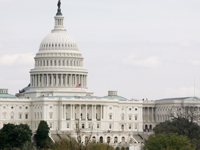Registration
You will receive an email confirming your registration.
IMGXYZ3285IMGZYXThe United States will hold its midterm elections on November 2. With the possibility of a double-dip recession and unemployment pushing 10 percent, it is unlikely that Democrats will maintain their majority in the House and Senate. At the same time, Sino-U.S. relations are increasingly strained over issues such as China’s fixed exchange rate and growing maritime assertiveness. As voters prepare to go to the polls in the United States, Dr. Zhang Chuanjie, Carnegie-Tsinghua Resident Scholar, was joined by several international relations experts in China to discuss what factors U.S. voters will consider in making their choices and how changes in Congress could affect U.S.-China relations.
Voting for “Change”
Most participants agreed that Democrats are likely to lose control of the House but maintain their majority in the Senate by a narrow margin. The group looked at the possible reasons for this outcome, its impact on President Obama’s approval ratings, and the potential effect on U.S. social politics.
- No Ideological Shift: Da Wei, vice head of research of the U.S. department at the Institute for Modern International Relations, argued that Obama’s 2008 victory did not represent a fundamental ideological change in the U.S. population. Voters based their decision on disaffection with the perceived failures of the Bush administration more than support for Obama’s policies.
- Grassroots Organizing: Zhao Kejin, Deputy Director of the Carnegie-Tsinghua Center, suggested that the rise of the conservative Tea Party movement—which has been galvanized by issues like health care reform—illustrates how the grassroots tactics Obama’s presidential campaign employed have changed how the public organizes itself for elections.
- Wrong Policy, Wrong Time: Tao Wenzhao from Tsinghua’s Center for U.S.-China Relations argued that one of the reasons for Obama’s drop in public support was his misplaced focus on health care reform at a time when the public was more concerned with unemployment and the economy. This gave the Republican Party an argument to rally opposition to and present themselves as a viable alternative choice to the voting public.
- Young Guns & Ideology: Paul Haenle, director of the Carnegie-Tsinghua Center, argued there would be noticeable changes in the makeup of both the House and Senate. There will be an unusually large number of new members, many of whom have not been significantly exposed to foreign affairs, he said, and many of these new members are also likely to be highly partisan and ideological.
- Home Front First: Xie Tao, associate professor at Beijing Foreign Studies University, and Chen Qi, Carnegie-Tsinghua Resident Scholar, maintained that while the changes in Congress would not significantly affect U.S. diplomacy, they would encourage U.S. leaders to focus on domestic issues in response to voters’ concerns. Shi Zhiqin, Professor of International Relations at Tsinghua University, added that U.S.-China relations may strengthen as a result of the Democrats losing the House.
Future of Sino-U.S. relations
Given a new political order, the panel examined how the United States would approach some of the issues affecting Sino-U.S. relations.
- Exchange Rate Relaxation: Republicans are less likely than Democrats to seek action on China’s monetary policy, although the White House will likely continue calling for China to increase the flexibility of its exchange rate. However, the fragile state of the U.S. economy could lead Republicans to attack China’s position on the Renminbi if U.S. business continues to suffer.
- Trade: Given the Republican Party’s traditionally stronger support for free-market policies, any gains the party makes in the House and Senate would likely increase progress on economic agreements between the United States and China, the panelists said. The panel also expected to see the United States place greater emphasis on such agreements and demand greater cooperation from China at multilateral discussions like the G20. Democratic losses will weaken Obama’s ability to implement quantitative easing and increase the likelihood that American business will look to emerging economies like China to support the U.S. economic recovery.
- U.S. Asia Strategy: Wang Fan, professor of international relations at the Institute of Diplomacy, argued that as the United States withdraws from its commitments in Afghanistan and Iraq, it will once again view Asia as a strategic priority. In addition, Wang said that he expects smaller, less-developed Asian nations to look to the United States as an independent arbiter to support and protect them from emerging continental players. This will be problematic, however, as it will require the United States to develop an Asia strategy that both avoids upsetting regional interests and is strong enough to protect U.S. interests in the region.
- China’s Changing International Role: Wei argued that China’s relationship with the United States was maturing as their commercial and political societies become increasingly interlinked. China should learn to adapt to such change and actively establish systems to enhance trust between the two countries. These sentiments were echoed by Chen, who argued that these changes are not only necessary for U.S.-China relations but also are necessary if China is to assume its place as a global leader. For example, Beijing’s approach to North Korea should be reframed in a way that leaves no room for misunderstanding with the United States. Tao argued that China has never been hostile to a unified Korea and that its interests, like those of the United States, are to maintain stability across the region.
Discussants: Wang Fan, Da Wei, Tao Wenzhao, Xie Tao
